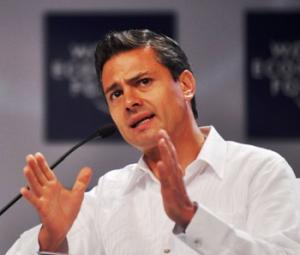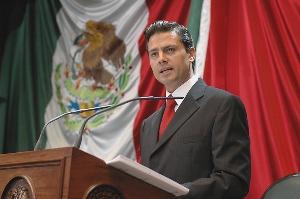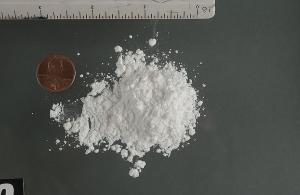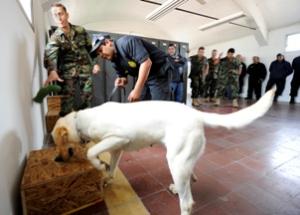Mexico's president-elect is going to rejigger the way the country prosecutes its war on the drug cartels, but no radical changes are apparent.
Mexico's next president has joined the ever growing chorus of Latin American leaders calling for a serious discussion of drug legalization, even as he announced he would continue to fight the drug war in Mexico.
It's official: Colombia has re-decriminalized the possession of small amounts of drugs for personal use.
DrugWarFacts.org, a publication of Common Sense for Drug Policy, is an in-depth compilation of key facts, stats and quotes on the full range of drug policy issues, excerpted from expert publications on the subjects. The Chronicle is running a series of info items from DrugWarFacts.org -- check them out!
California continues to have conniptions over medical marijuana, a scientific review finds marijuana's Schedule I status "untenable," and much, much more.
A solid majority of Canadians want to decriminalize marijuana possession, even as the national government heads in the opposite direction.
There's a whole lot of nastiness going on inside the Nevada Highway Patrol's drug dog program, and now a lawsuit by disgruntled troopers is revealing some highly questionable policing.
A Puerto Rican narcotics officer becomes the year's 29th drug war fatality after being ambushed in his vehicle Tuesday night.
Here are five more people who died in recent weeks in law enforcement operations related to drug law enforcement.
A crooked narc scandal in Florida just keeps on giving, a sticky-fingered Kansas City cop goes to jail, a former Arizona cop is in trouble for stealing pain pills, and an Arizona ICE agent cops to providing info to the cartels.
Dismayed and horrified by the wave of prohibition-related violence unleashed on Mexico with President Calderon's deployment of the military to fight the country's wealthy and powerful drug trafficking organizations -- the so-called cartels -- Mexican voters on Sunday appear to have rejected Calderon's party, the PAN, instead harkening back to the past, choosing as president-elect Enrique Peña Nieto, candidate of the PRI, the party that dominated Mexico for most of the 20th Century.

Mexico's likely next president, Enrique Peña Nieto (wikimedia.org)
While Peña Nieto is virtually certain to be Mexico's next president, it's not quite official yet.
Mexico election officials are recounting half the ballot boxes because of inconsistencies in the tallies and expect to release final results Sunday. But with
Peña Nieto holding a five-point lead over second place finisher Andre Manuel Lopez
Obrador, the recount is unlikely to change the outcome.
The election came amidst relentless and terrifying violence. At least 55,000 people have been killed in the internecine conflicts among the rival cartels and in the multisided fighting between the cartels, the police, and the military, with thousands more gone missing. Election week saw a new video of Gulf Cartel operatives beheading four
Zetas, as well as the killing of three federal police officers at the Mexico City airport by other federal police officers being targeted in a drug trafficking investigation.
That is nothing unusual for Mexico these days, six years after Calderon sent 50,000 troops and federal police out to stop the cartels. The question is whether
Peña Nieto is going to do anything substantially different once he takes power in December, and right now, the answer is unclear.
During the run-up to Sunday's election, the charismatic former governor of the state of Mexico attempted to create some distance between himself and Calderon's approach, but his policy prescriptions appear to be more in the nature of adjustments than a radical rethinking. He has made two direct proposals for retooling Mexico's drug war and one key appointment.
Peña Nieto has called for the creation of a paramilitary force of 40,000 ex-soldiers to take the burden of fighting the heavily-armed cartels from the military, which has seen an increasing number of human rights complaints filed against it. But that will take time to pull together, and he has said nothing about sending the military back to its barracks before then.
He is also calling for something like a single unified national police force, or what he calls the
mando unico, the unified command. Calls for reforming Mexico's police, with its thousands of different municipal, state, and federal department, have been a constant for at least the last quarter-century, as those forces repeatedly expose themselves as hopelessly corrupt and inefficient. But reorganizations have been done before, only to create a new cadre of cops to be corrupted.

The US-Mexican border
In another sign of the direction he intends to take the country,
Peña Nieto this week appointed as an internal security advisor the former chief of the Colombian national police, Oscar
Naranjo. Working closely with the US,
Naranjo vastly expanded the intelligence apparatus of the national police and is credited with helping to bring down the
Medellin and Cali cartels. But
Naranjo also ran the national police under the presidency of Alvaro
Uribe, a period marked by shady dealings with rightist
paramilitaries linked to the drug trade.
On Tuesday,
Peña Nieto told PBS he would continue to use the military indefinitely.
[Editor's Note: In that same interview, he had some words to say about discussing drug legalization; see our news brief on that here.]
"I will maintain the presence of a Mexican Army, and the Navy and police in the states of the Mexican Republic, where the problem of crime has increased," he said. "We will adjust the strategy so that we can focus on certain type of crimes, like kidnapping, homicide, extortion, which today, unfortunately, have worsened or increased, because we have a lot of impunity in some areas. The state's task is to achieve more efficiency, and to go back to the rule of law and enforce laws strictly in our country."
Raising eyebrows in Washington,
Peña Nieto has previously hinted that he may refocus Mexico's anti-crime efforts, placing lesser emphasis on nailing cartel kingpins and eradicating illicit crops and placing more emphasis on reducing the violence.
"Violence is the most sensitive issue for Mexicans," he told the
Financial Times in his first interview with an international newspaper. "Mexico cannot put up with this scenario of death and kidnapping."
Such comments have led many observers in both Mexico and the US to suggest that
Peña Nieto may revert to the PRI's old ways. It is commonly believed -- although difficult to prove -- that during the latter part of its 70-year rule, that the PRI did not so much attempt to suppress the drug trade but to manage it, allowing itself to be bought off by the cartels. In return for non-interference from the state, the drug traffickers would keep a relatively low profile as they went about their business. What is certain is that the levels of violence around the drug trade and its repression have soared during the 12 years the PAN held power and moved aggressively against the cartels.
[Ed: Whether or not the government or individual officials made explicit deals with the cartels, it is generally understood among scholars that government's mostly manage illegal drug trades rather than seriously trying to undo them -- doing so enables them to keep crime within "normal" levels, as opposed to the kinds of bloodbaths seen in Mexico recently or Colombia during the time of Pablo Escobar.]
Sensitive to such charges,
Peña Nieto took pains to say he was not going to make deals with the cartels. "There will be no pact or truce with organized crime," he said.
"What's really going on is that he's being very careful to assure the US that it will be business as usual, that they will continue fighting the drug war," said Nathan Jones, a fellow in drug policy at the
Baker Institute in Houston. "There could be ways you could shift from counter-narcotics to counter-violence and have it be in line with US policies. With a counter-violence strategy, you would be consciously and publicly targeting the most violent cartels, but they're already doing that."

What drug prohibition brings Mexico (PGR Mexico)
"Much is up in the air in terms of what differences there will actually be once he comes to power in December," said Elise Dunn, a research associate at the
Council on Hemispheric Affairs. "On the one hand, he has promised not to negotiate with the drug cartels, and on the other hand, he comes to power at a difficult time, but I don't think the strategy will change dramatically. No president is going to lose the appearance of taking a hard stand against the cartels, but there are many accusations that he will deal with them, and those accusations are based on the past behavior of the PRI."
Still, Dunn said, the PRI has traditionally had a close relationship with the US, and Peña Nieto will seek to keep it that way.
"I would anticipate that in public relations with the US, he will say they'll go after the capos, but that's very much up in the air," she said. "He has also suggested that putting the military back in its barracks is an option, but I consider that very unlikely given the pressures the US would exert."
It is also unlikely, at least in the near term, because there is no effective force in place to replace the military.
"This idea of the paramilitary force composed of former soldiers seems to be popular in Mexico because the military is the second most respected institution in the country behind the Catholic Church," said Jones, "but 40,000 men is a very large force and that will take time to build, so they continue to have to use the military at least for the short term."
"The one reform Mexico really needs is a complete overhaul of its police force," said Dunn. "Peña Nieto has suggested the shift, and his paramilitary plan could be the core of a national police force. We need a complete overhaul of the more than 2,000 different police forces that have been rife with corruption and lack of transparency, but what that overhaul will look like is up in the air."
Reforming law enforcement, though, is an old and so far failed game in Mexico. As each corrupted unit or department is disbanded and replaced, the new ones consistently fall prey to the same temptations.
"One problem is that Mexico has been readjusting its federal police forces since the 1980s, they've had an alphabet soup of federal drug enforcement agencies, so I'm a bit skeptical about a new one," she added.
One obstacle to reforming the Mexican police will be political. While Peña Nieto triumphed on Sunday, the PRI failed to achieve a majority in the congress. That means he will need the support of other parties to move forward on the idea, and that's by no means a given.
Peña Nieto has five months before he takes office in December. There is no sign of any let-up in the prohibition-related violence, nor any sign all the captures or killings of cartel higher-ups are having any impact on the violence or the drug trade. And there appears to be little sign that the new president will do anything radically different about it -- at least not out in the open.
back to top
Mexico's likely president-elect, Enrique Peña Nieto, said in a PBS Newsmaker interview that aired Tuesday evening that Mexico should discuss legalizing drugs and regulating their sale, and that the US and other countries should be part of the discussion as well. But he also said that he wasn't calling for legalization and that he would continue using the military in Mexico's battle against its powerful drug trafficking organizations, the so-called cartels.

Mexican president-elect Enrique Peña Nieto (cddiputados.gob.mx)
While
Peña Nieto is virtually certain to be Mexico's next president, it's not quite official yet.
Mexico election officials are recounting half the ballot boxes because of inconsistencies in the tallies and expect to release final results Sunday. But with
Peña Nieto holding a five-point lead over second place finisher Andre Manuel Lopez
Obrador, the recount is unlikely to change the outcome.
[Editor's Note: For our feature article on what Peña Nieto might mean for Mexico's future drug policy, published just as the PBS interview aired, go here.]
"I'm in favor of opening a new debate in the strategy in the way we fight drug trafficking. It is quite clear that after several years of this fight against drug trafficking, we have more drug consumption, drug use and drug trafficking. That means we are not moving in the right direction. Things are not working," he told PBS's Margaret Warner in Mexico City. "I'm not saying we should legalize," he repeated. "But we should debate in Congress, in the hemisphere and especially the US should participate in this broad debate."
"So let the debate begin, but you're not taking a position yet?" Warner asked.
"That's right," he said.
Peña Nieto joins an ever growing list of Latin American leaders calling for frank discussions on alternatives to US-style drug war policies. The incipient rebellion has been brewing for years, but broke into the open on the hemispheric diplomatic this spring at the Organization of American States' Summit of the Americas in Cartagena, Colombia.
Although US media coverage of the summit was devoted almost entirely to the bright shiny object that was the Secret Service prostitution scandal, the summit saw Latin American leaders, including Colombian President Santos and Guatemalan President Perez Molina urge that formal discussions take place. And just days ago, Uruguayan President
Mujica joined the ranks of the drug war dissenters, as his government put forth plans to establish a state monopoly on marijuana sales.
While
Peña Nieto's comments on debating legalization won't be welcomed with open arms in Washington, his affirmation that he will largely continue the policies of his predecessor, President Felipe Calderon, will reassure politicians and policymakers worried that he was going to go soft on the cartels. While he would shift the focus from going after gang
capos to reducing the violence, the Mexican state would continue to battle organized crime, he said.
"I know there is a concern around this issue, in terms of assuming this adjustment means not going after drug cartels involved in drug trafficking. No, absolutely not," he insisted.
"I will maintain the presence of a Mexican Army, and the Navy and police in the states of the Mexican Republic, where the problem of crime has increased," the telegenic former governor of Mexico state emphasized. "We will adjust the strategy so that we can focus on certain type of crimes, like kidnapping, homicide, extortion, which today, unfortunately, have worsened or increased, because we have a lot of impunity in some areas. The state's task is to achieve more efficiency, and to go back to the rule of law and enforce laws strictly in our country."
And while he said he wanted to intensify cooperation with the US, he made clear that he felt the US had failed to do enough to stop gun-running into Mexico. That has been a complaint of Calderon's as well.
"We have been insisting on getting the US more involved in arms control,"
Peña Nieto said bluntly. "Unfortunately, it has had no impact."
The cracks in the wall of global drug prohibition keep getting bigger, and that bleeding fissure opened up by Mexico's wave of prohibition-related violence has created yet another stress point on the prohibitionist consensus. We may not be there quite yet, but the time when that wall finally collapses is coming.
back to top
Colombia's Constitutional Court has approved the government's proposal to decriminalize the possession of small amounts of drugs for personal use. The opinion (scroll down to item three, Expediente D-8842) issued last Sunday re-decriminalizes drug possession in Colombia, which had decriminalized by the courts in the 1990s, only to be recriminalized under former President Alvaro Uribe.

In Colombia, you can possess a gram of coke with no fear of arrest. (wikimedia.org)
The country's Supreme Court last year held that
Uribe's recriminalization was unconstitutional. The government of President Juan Manuel Santos then moved to fill the legislative void by introducing decriminalization as part of a broad public safety bill,
Law 1453. The Constitutional Court's ruling upholds the decriminalization portion of Law 1453.
Under the law, people caught with less than 22 grams of marijuana or one gram of cocaine for personal use may not be arrested or prosecuted, but could be referred to treatment. The law also decriminalizes the possession of other drugs, but it is unclear in what amounts.
The ruling was welcomed by Ethan
Nadelmann, executive director of the
Drug Policy Alliance.
"Today's judicial ruling in Colombia represents yet another important step in the growing political and judicial movement in Latin America and Europe to stop treating people who consume drugs as criminals worthy of incarceration," he said. "It is consistent with prior rulings by Colombian courts before former president
Ãlvaro Uribe sought to undermine them, and also with rulings by the Supreme Court of Argentina in 2009 and other courts in the region. The Colombian Constitutional Court's decision is obviously most important in Colombia, where it represents both a powerful repudiation of former president
Uribe's push to criminalize people who use drugs and a victory for President Juan Manuel Santos’ call for a new direction in drug policy."
"Most decriminalization initiatives in Latin America, however, are being proposed and enacted not by courts but by presidents and national legislatures,"
Nadelmann continued. "In addition to President Santos, Guatemala's new president, Otto
Pérez Molina, is an advocate of decriminalization as are -- in various ways and to different degrees -- the presidents of Costa Rica, Uruguay, Ecuador and Argentina. Some Latin American countries, it should be pointed out, never criminalized drug possession in the first place. This trend follows in the footsteps of European reforms since the
1990s. Portugal, which decriminalized drug possession in 2001, stands out as a model."
"Decriminalizing drug possession appears to have little impact on levels of illicit drug use,"
Nadelmann argued. "Its principal impacts are reducing arrests of drug users, especially those who are young and/or members of minority groups; reducing opportunities for low level police corruption; allowing police to focus on more serious crimes; reducing criminal justice system costs; and better enabling individuals, families, communities and local governments to deal with addiction as a health rather than criminal issue."
"The United States clearly lags far behind Europe and Latin America in ending the
criminalization of drug possession,"
Nadelmann noted. "Momentum for reform is growing with respect to decriminalization of marijuana possession, with Massachusetts reducing penalties in 2008, California in 2010, Connecticut in 2011 and Rhode Island earlier this year. All states, however, treat possession of other illegal drugs as a crime. Thirteen states, the District of Columbia, and the federal government currently treat possession of drugs for personal use as a misdemeanor, with penalties of up to a year in jail. The remaining thirty-seven states treat possession of cocaine, heroin and other drugs as a felony, with penalties than can include many years in prison."
back to top
Did you know that the federal government alone has spent more than $208 billion on the drug war since 2004? Read about it in the Economics section of DrugWarFacts.org.
DrugWarFacts.org, a publication of Common Sense for Drug Policy (CSDP), is an in-depth compilation of key facts, stats and quotes on the full range of drug policy issues, excerpted from expert publications on the subjects. The Chronicle is running a series of info items from DrugWarFacts.org, and we encourage you to check it out.
Follow Drug War Chronicle for more important facts from DrugWarFacts.org over the next few weeks, or sign up for the DWF new facts RSS feed. Read last week's Chronicle DrugWarFacts.org blurb here.
Common Sense for Drug Policy is a nonprofit 501(c)(3) organization dedicated to reforming drug policy and expanding harm reduction. CSDP disseminates factual information and comments on existing laws, policies and practices.

back to top
California continues to have conniptions over medical marijuana, a scientific review finds marijuana's Schedule I status "untenable," and much, much more:
National
On Monday, the
Open Neurology Journal published a
review of several recent clinical trials assessing the safety of medical marijuana that found marijuana's current placement as a Schedule I controlled substance with no medical value in not scientifically justified. "Based on evidence currently available, the Schedule I classification is not tenable; it is not accurate that marijuana has no medical use, or that information on safety is lacking," the authors wrote. The lead author is Dr. Igor Grant, director of the Center for Medicinal Cannabis Research. The review and its conclusions directly contradict the stance of the DEA and FDA.
California
Last Wednesday,
the state Supreme Court declined to review a lower court decision that okayed the city of Los Angeles shutting down a Culver City dispensary. The city had used nuisance abatement measures to shut down the
Organica dispensary, and the store had appealed, arguing that it was protected by state law allowing collectives. LA city attorneys lauded the decision as vindicating their stance "dispensing and selling marijuana…remains illegal." Medical marijuana advocates beg to differ, and all are waiting on the Supreme Court to settle the issue when it decides another dispensary case later this year.
Last Thursday,
Fresno banned outdoor grows within the city limits. The city council voted unanimously for the ban, which was recommended by Police Chief Jerry Dyer, who said outgrows promote violence in the city. A temporary ban had been in place since January. Under the new rule, cultivating the drug in an enclosed and secure structure, and in compliance with state marijuana law, is permitted.
Also last Thursday,
a Santa Fe Springs councilman pleaded guilty in federal court to soliciting a bribe from a would-be medical marijuana dispensary operator. Councilman Joseph Serrano copped to the offense, then resigned his seat later that same day.
Last Friday,
Rancho Mirage ordered a dispensary to close after city officials became aware of it when "residents in the area complained of smelling marijuana." The city is already being sued by two other dispensaries that have been forced out of business by the city's moratorium on dispensaries.
Also last Friday,
a Sacramento ballot initiative signature-gathering effort came up short. Sponsored by the Committee for Safe Patient Access to Regulated Cannabis (
CSPARC), the initiative sought to provide safe, regulated access for patients in the county. They needed 42,300 signatures by Monday and only had 25,000. While the measure will now not qualify for the November ballot, it could still qualify for a later election if it gets the necessary signatures by July 23.
On Monday,
a state appeals court ruled that LA County's ban on dispensaries is illegal. "[… T]he County's complete ban on all 'medical marijuana dispensaries,' including collectives and cooperatives authorized under Health and Safety Code section 11362.775, conflicts with, and is thus preempted by, California's medical marijuana laws," wrote Judge P.J.
Mallano in the unanimous decision handed down by the California Court of Appeals (
2nd District) . The case is County of Los Angeles v. Alternative Medicinal Cannabis Collective, et al. The ruling is being seen as a major blow to arguments made in defense of the legality of dispensary bans.
Also on Monday,
medical marijuana growers sued Yuba County over its new nuisance ordinance for marijuana cultivation. The lawsuit charges that the ordinance adopted by supervisors in May is overly restrictive and runs afoul of state law. Next week, the growers will file a request for a temporary restraining order to stop the ordinance from being enforced. The county's ordinance placed limits on the number of plants, the amount of ground the plants could be grown on, and the types of parcels where they could be grown. But the complaint states the ordinance doesn't address collectives, where one person might grow several plants on behalf of others, beyond the six-mature-plant limit stipulated in the ordinance.
Also on Monday,
San Leandro put its plan to ban dispensaries on hold in the wake of the state appeals court ruling County of Los Angeles vs. Alternative Medical Cannabis Collective earlier the same day. That ruling invalidated LA County's ban on dispensaries. San Leandro has a temporary moratorium in place and had planned to make it permanent. That moratorium expires September 30.
On Wednesday, activists reported that a raid was underway at a Sacramento dispensary. The action, apparently undertaken by the Sacramento County Sheriff's Office was aimed at the First Amendment dispensary inside the Farmer's Market.
Colorado
Last Friday,
a jury found medical marijuana patient Bob Crouse not guilty of possession with intent to distribute.
Crouse, a leukemia sufferer argued that he needed large numbers of plants to ensure a steady supply of "phoenix tears," a slushy oil derives from marijuana plants. It takes a pound of marijuana to make an ounce of the oil. While state law limits patients to cultivating three plants, it also allows patients to possess as much as medically necessary.
Crouse mounted an affirmative defense, and the jury agreed with him.
Massachusetts
Last Friday,
a poll showed strong support for medical marijuana. The Public Policy Polling survey found that 57% of those polled said they would be okay with allowing patients to have access to medicinal pot, whereas 33% of voters were against it. The poll had a margin of error of +/- 3.3%.
On Monday,
backers of a medical marijuana initiative said they had submitted enough signatures to make the November ballot. The Committee for Compassionate Medicine said it had more than the 11,000 additional signatures needed by Tuesday's deadline. The initiative would legalize marijuana for the treatment of certain illnesses and set up a dispensary system.
Michigan
Last Wednesday,
an appeals court ruled patients can be arrested for marijuana possession if they don't have their state-issued paperwork or registry card. An appeals panel had earlier ruled that James Nicholson of Ottawa County could be immune from prosecution by producing his medical marijuana paperwork in court, but the full court disagreed, holding that medical marijuana registry cards and applications must be "reasonably accessible at the location" of an arrest for an individual to be immune from arrest.
Montana
Last Wednesday,
medical marijuana entrepreneur Jason Christ filed a lawsuit against the Missoula Police Department, Missoula County Attorney’s Office, Missoula County 911, and other parties in US District Court. He is seeking $50 million in punitive damages, among other demands, for the defendants' "willful and malicious actions" that have caused him "emotional distress." Christ claims he is so harassed that it has "affected his bodily functions" and forced him to camp "down a vast network of unimproved dirt roads." The controversial Christ gained notoriety in 2009 and 2010 by helping thousands of people obtain physician recommendations for medical marijuana with his traveling one-day clinics, a move other medical marijuana advocates have criticized as providing fodder to foes, who successfully gutted the state law last year.
Nevada
On Monday,
a legislator said he will introduce a medical marijuana bill next year that would allow registered patients a legal way to obtain their marijuana. Assemblyman Tick
Segerblom (D-Las Vegas) said Monday he requested the bill because the legislature has failed in its duty to create an appropriate way for legal users to acquire marijuana.
Segerblom wants to establish certified marijuana dispensaries, licensed farms where marijuana may be grown and to allow patients to buy from California dispensaries. His bill also calls for this medical marijuana to be taxed, although a rate has not yet been established. Another medical marijuana bill is being introduced by the Assembly Judiciary Committee. Details were not available.
New Jersey
Last Wednesday, a would-be dispensary operator sued the city of Camden over its rejection of his dispensary and cultivation application. Ilan Zaken, the owner of two vacant clothing stores, filed the lawsuit against the city, its zoning officer and its Zoning Board of Adjustments, alleging that they illegally rejected his application to use the buildings for the production of medical marijuana. Since New Jersey's Compassionate Use Medical Marijuana Act went into effect more than two years ago and since Gov. Chris Christie (R) cleared the way earlier this year, only two of the six nonprofits approved by the state to sell marijuana have won the necessary local permits.
back to top
Nearly two out of three Canadians favor decriminalizing the possession of small amounts of marijuana, according to an Ipsos Reid poll released Sunday. Some 65% of those polled said they favored decriminalization, while only 34% opposed it.
The poll results continue a long-term trend in support of looser marijuana laws in Canada. In 1987, only 39% supported decriminalization. By 1997, that number had climbed to 51% and by 2003, it had climbed to 55%.
Support for decriminalization was strong around the country, but strongest in Atlantic Canada (71%), Ontario (69%), British Columbia (69%), and Saskatchewan and Manitoba (69%). Support was stronger among those with university degrees (71%) and those with some college (71%) than those with only a high school diploma (63%). And more affluent Canadians had the strongest support for decriminalization, at 77%.
The poll results come as the Conservative federal government of Prime Minister Stephen Harper attempts to crack down on marijuana with the omnibus crime bill, C-10, it passed in March. That bill created mandatory minimum sentences for growing as few as six marijuana plants.
A decade ago, before the Conservatives took power, the then ruling Liberals considered decriminalizing marijuana, but the proposal never moved out of Parliament.
back to top
A group of Nevada Highway Patrol troopers and a retired police sergeant have filed a lawsuit against the Patrol and the Las Vegas Metro Police charging them with racketeering and corruption. The charges center on the department's training and use of drug-sniffing dogs.

Drug sniffing dogs can be trained to alert on cue. (US Navy)
The troopers'
complaint opens a most unflattering window on personal bickering, bureaucratic infighting, and unethical behavior among state law enforcement officials, as well as alleging unconstitutional policing practices, including unlawful searches and seizures and training drug dogs to learn "cues" about when to signal they have found drugs.
The complaint centers on what the troopers say was the intentional effort of Nevada Highway Patrol Commander Chris Perry to undermine the drug dog program after it was approved by then
Gov. Jim Gibbons and retaliation against drug dog-handling troopers by Perry and his underlings.
But it reveals patterns of racial profiling, unconstitutional searches and seizures, and enforcement driven by hopes of asset forfeiture (which, incidentally, funded the entire drug dog program). The suing troopers allege that other troopers and Las Vegas Metro Police narcotics officers would illegally poke and open packages at a
Fedex processing center to make it easier for drug dogs to hit on them.
Equally seriously, the complaint alleges that some drug dogs were intentionally trained to provide false alerts that they had detected drugs by responding to cues from their handlers. Using a false drug dog alert as the basis for initiating a search is illegal.
The complaint accuses Perry and his underlings of violating the Racketeer Influence and Corrupt
Organizaion (RICO) act by conspiring to use the improperly trained drug dogs to systematically conduct illegal searches and seizures for financial benefit.
None of the individuals or law enforcement organizations named in the lawsuit have yet publicly responded.
back to top

Victor Soto-Velez
An off-duty Puerto Rican police officer was shot and killed last Tuesday night in what local news reports are calling an ambush related to his work as a drug agent. Officer Victor Soto-Velez, 37, becomes
the 29th person to die in US domestic drug law enforcement operations so far this year.
According to the newspaper
Primera Hora, Soto-Velez was driving his Ford Explorer on a highway in
Camuy when he was ambushed. He was able to provide information about his assailants before he died.
As police investigated, they encountered a burning vehicle in the vicinity that matched the description of the attackers' vehicle provided by Soto-Velez.
Local police told
Primera Hora that almost as soon as the shooting occurred, they received information that the attack had been directed specifically at Soto-Velez, who been an agent of Puerto Rican Police Division of Drugs in
Arecibo.
Soto-Velez, a 13-year veteran of the force, left behind two daughters, aged 11 and 19.
No suspects have been arrested so far.
back to top
At least five people have been killed in the drug war on America's streets in the past few weeks. They become the 30th through the 34th persons to die in US domestic drug law operations so far this year.
While we try to publish these stories in a timely fashion, it doesn't always work out that way because initial news or police accounts fail to provide adequate detail. In the two cases below from May, for example, the drug war link became apparent only with the release of a toxicology report in one instance and the release of court documents in the other.
In Sonora, California,
James Jones died in police custody on May 3 after swallowing an eight-ball (3.5 grams) of methamphetamine while being searched at the
Toulomne County Jail upon being arrested for outstanding warrants. When Jones was taken to the jail, deputies found a glass pipe, prompting them to strip-search him. They observed a white object in his mouth, but when they told him to spit it out, he swallowed it instead. He was then rushed to the hospital, but died of the methamphetamine overdose. A toxicology report released last week showed he had about 16 times the potential fatal level of meth in his system.
In Miami,
Sergio Javier Azcuy was shot and killed on May 17 by Miami-Dade police who had set up a fake cocaine rip-off, then staged a traffic accident to corral the vehicle in which he was traveling.
Azcuy, 46, was the passenger in the vehicle stopped by the Miami-Dade Special Response Team, and police shot and killed him when he reached for a "dark shiny object." Police found a cell phone in his hand. Records did not indicate whether he was armed, meaning that he wasn't. The same Miami-Dade robbery unit killed four men in another fake cocaine rip-off last year and two more in a similar set-up in 2007.
In Dallas,
Kendrick McDaniel was shot and killed June 24 by an off-duty Dallas police officer during a confrontation at a local Taco Bell. Officer Courtney Howard entered the restaurant and saw McDaniel, 18, and two other teens sitting there. Howard noticed McDaniel had a marijuana cigarette behind one ear, and approached the teens. According to police, McDaniel got angry and starting cursing at Howard. Howard then pulled his weapon, and McDaniel started to run, fell, and then pulled a gun from his waistband. Howard then shot him. He died shortly thereafter at a local hospital. McDaniel's sister,
Cedrickia, said she doubted the police version of events, adding that she didn't think her brother would pull a gun on an officer. The killing will go before a grand jury.
In Atlanta,
Christopher Calhoun was shot and killed by Atlanta police last Wednesday as they attempted to arrest him on a fugitive warrant for drug and auto theft charges from Mississippi. Police got a tip Calhoun, 38, was in a vehicle at a local shopping mall, and shot and killed him when he didn't surrender peacefully. There was little detail beyond that, except one witness said police pulled up in several vehicles, jumped out of their cars, and yelled "Freeze!" before opening fire. The killing is being reviewed by the Georgia Bureau of Investigation.
In North Fort Myers, Florida,
Carlos Joseph Charles was shot and killed last Thursday by a Lee County sheriff's deputy after the vehicle he was driving was pulled over by the sheriff's Highway Interdiction Unit. Charles, 28, was driving with a woman and a four-year-old child when deputies stopped his vehicle. All three were ordered out of the vehicle when a drug dog alerted on it. When deputies found "a large amount" of cocaine, a "violent altercation" ensued and Charles was fatally wounded. The unnamed deputy was reportedly injured, but was quickly released from the hospital. Charles had been sentenced to two years in state prison on cocaine charges in 2008.
back to top
A crooked narc scandal in Florida just keeps on giving, a sticky-fingered Kansas City cop goes to jail, a former Arizona cop is in trouble for stealing pain pills, and an Arizona ICE agent cops to providing info to the cartels. Let's get to it:
In Largo, Florida,
a criminal investigation has been launched into the actions of four Pinellas County sheriff's narcotics unit members. They have been accused of trespassing to gather evidence against indoor marijuana growers. Pinellas County Sheriff Bob
Gualtieri announced the criminal investigation after three of the narcs resigned and he fired one last Thursday, capping a departmental internal investigation. The scandal around the narcs' behavior has become a major issue in
Gualtieri's re-election campaign, where he faces challengers in the Republican primary as well as a highly critical Democratic candidate.
In Phoenix, Arizona,
a former Phoenix police detective was arrested last Wednesday on evidence tampering and narcotics theft charges. William McCartney, 37, was indicted days earlier on a 40-count felony indictment accused of multiple counts of tampering with evidence, possession of narcotics, possession of dangerous drugs, computer tampering, felony theft and fraudulent schemes. McCartney went down after a quarterly audit of items cleared for destruction from the evidence room found that
Oxydocone tablets had been replace by over-the-counter medications. McCartney was originally arrested in March 2011, but quit the force and left the area. He was re-arrested in Pittsburgh after he was indicted.
In Kansas City, Kansas,
a former Kansas City police officer was sentenced last Wednesday to a year and a day in prison for stealing electronic goods from homes where he and his team were serving drug search warrants. Darrell Forest, 32, was a member of a special unit that served search warrants, and went down in an FBI sting operation after authorities received complaints. Two other members of the squad have also pleaded guilty to theft and await sentencing.
In Tucson, Arizona,
a former ICE agent was sentenced last Friday to 30 months in federal prison for accessing law enforcement data bases and passing sensitive information on to family members with ties to Mexican drug cartels.
Jovana Deas went down after some of the information she passed turned up on the computer of a Mexican drug trafficker arrested in Brazil. Among the seven felonies and 14 misdemeanors she pleaded guilty to are illegally obtaining and disseminating classified government documents, obstruction of justice, and perjury. She is the
138th ICE or Border Patrol officer arrested on corruption charges since October 2004.
back to top











